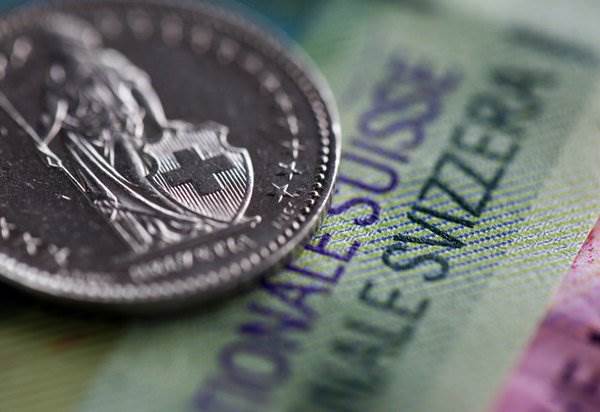 The Swiss Franc has declined for four consecutive days against the U.S. dollar, dropping around 4.05 percent since Tuesday last week.
The Swiss Franc has declined for four consecutive days against the U.S. dollar, dropping around 4.05 percent since Tuesday last week.
On Monday last week, the Swiss National bank intervened in the foreign exchange market, lifting its interventions to a three-year high, as an attempt to control the value of the Swiss Franc, which is seen as a safe haven by the investors during turbulent times, and to offset financial losses. Total sight deposits increased from 598.548 to 602.992 billion Swiss francs, the biggest increase since March 2017 and exceeding the 2.3 billion Swiss francs the bank spent in 2018.
It is known that the continuous appreciation of a currency could turn out to be detrimental for the economy, especially if the appreciation is being driven out by speculation and not by the increase of its fundamental value. This is especially true during a recession since an appreciation could lead to a strong fall in the domestic demand.
Therefore it shouldn't surprise us that the bank decided to intervene aggressively in the foreign exchange market, especially since the world seems to be going towards an economic recession. Nevertheless, investors kept flowing towards the Swiss Franc on Monday, and it finished in positive territory at the end of the session, gaining 0.28 percent against the US dollar.
On Tuesday, the Swiss Franc began losing territory against the dollar, given the surge in the demand of the later. The trend continued in the next days despite the Federal Reserve's decision to expand the dollar swap lines with other top central banks. It's a well-known fact that financial turbulence tends to exacerbate the demand for the US dollar, especially since investors are selling off assets (many of them are dollar-based) to offset their financial losses.
The Swiss National Bank announced on Thursday its decision to leave the cash rate unchanged at -0.75 percent, a move that was predictable from the analyst's point of view. The move was in line with the ECB's latest decision not to cut the interest rates and it's understandable given the limited room for maneuvering. Nevertheless, some expect a cut in the future. Credit Suisse, for example, expects a cut to -1.0 percent in the second quarter while Societe Generale foresees a cut to -0.85 percent in the third quarter.
On its assessment, the bank acknowledged that the spread of the coronavirus poses a significant challenge in social and economic terms for the country. The bank expects a pronounced economic decline associated with the advance of the outbreak and claimed that the recovery will depend on the impact of the monetary, fiscal and healthcare policy measures.
Right after the announcement, the SNB's chairman called for fiscal support, remaining in line with his European counterpart Christine Lagarde. Fortunately, Switzerland (a fiscally conservative country) has plenty of room for expansionary fiscal policies given its low public debt level, so it's safe to expect an appropriate and substantial fiscal response in the future. Meanwhile, the Swiss Federal Council is already attempting to aid the economy, like implementing unemployment and financial compensations and bank loan guarantees.
Next week the Centre for European Economic Research is releasing the ZEW Survey Expectations which shows employment, business conditions, and other elements of the Swiss business sector, and the Swiss National Bank is publishing its quarterly bulletin for the first quarter.
